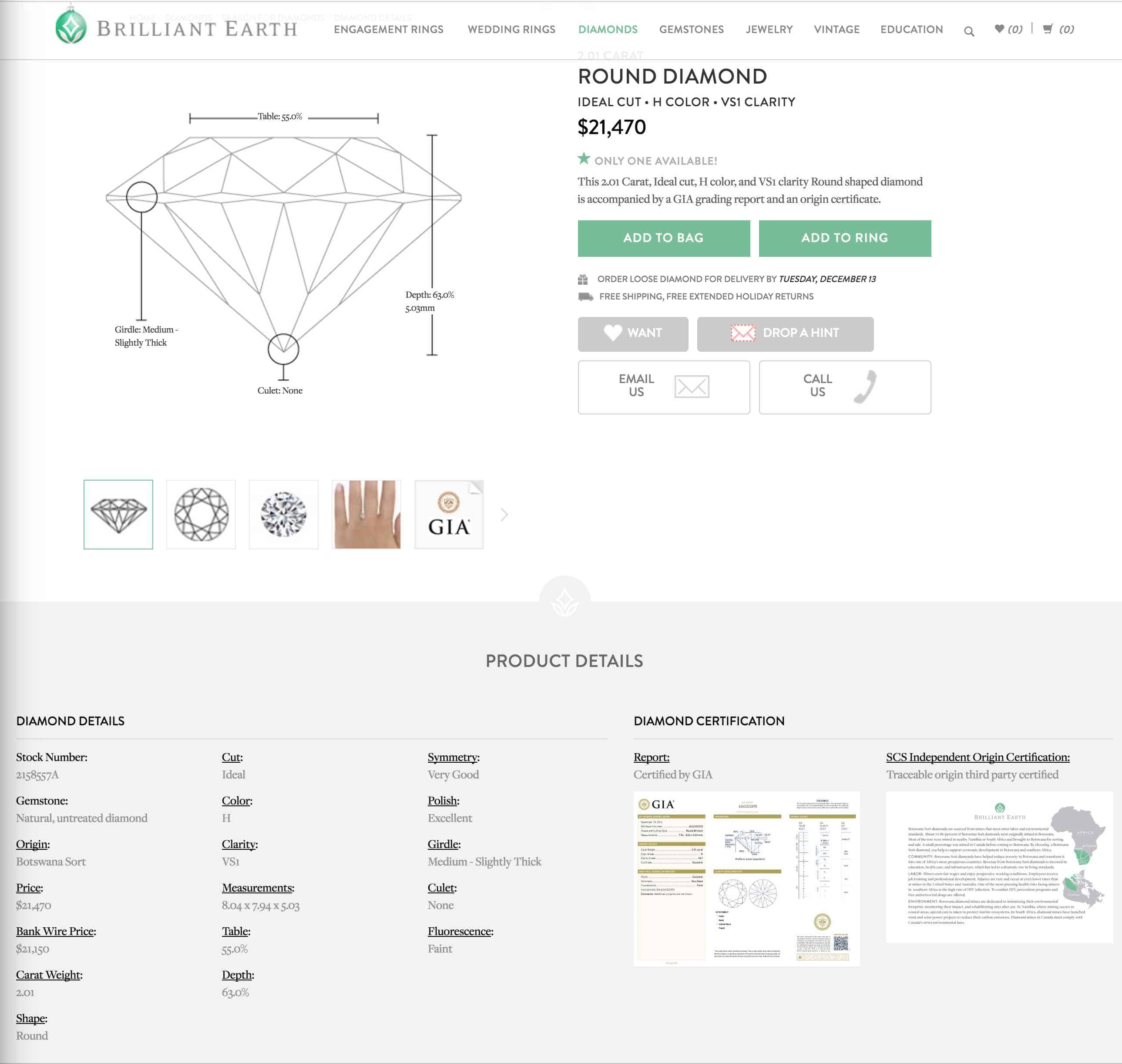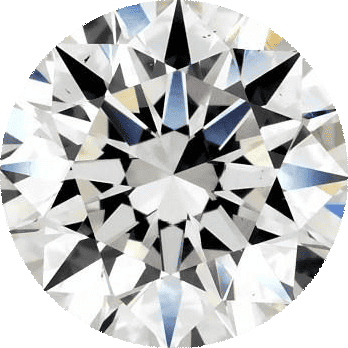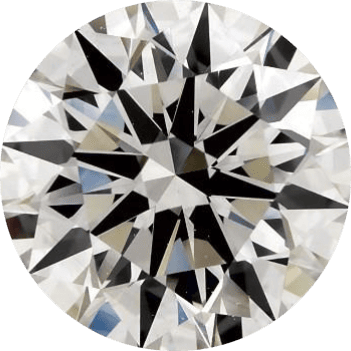 | |||||
| Overall Score:4 | |||||
| Price:3.5 | Selection:4.5 | Customer Service: 4 | |||
| Pros |
| ||||
| Cons |
|
Brilliant Earth has gone from a niche retailer to one of the major online retailers over the last decade.They also have a budding network of physical showrooms around the United States. Brilliant Earth is a fantastic option to purchase a diamond engagement ring or other diamond jewelry. Their lab-grown diamond selection is great, and their unique settings made from recycled metals are a huge bonus. Their natural diamond selection comes with a premium price, but you can still find a superb natural stone for your ring if that is the path you choose.
I have worked in the diamond industry for 20 years. I spent the first 8 years working on the corporate side for manufacturers and wholesalers. For the last 12 years, I’ve dedicated myself to helping our readers, you, by secret-shopping thousands of stores, writing educational content, and helping my team answer your personal questions.
This review is based on my research of the company as well as multiple secret-shopping visits over the last couple of years. We will cover everything you need to know to help guide you in purchasing a diamond from Brilliant Earth.
What we’ll cover in this article:
Brilliant Earth lab-grown diamonds
Brilliant Earth’s engagement rings
Secret shopping Brilliant Earth showroom in 2023
Showroom reaction video
Brilliant Earth’s natural diamonds
Are Brilliant Earth diamonds really conflict free?
Why you should trust us
Brilliant Earth Lab-Grown Diamonds
This is the primary reason we decided to improve our star rating of Brilliant Earth. As lab-grown diamonds (LGDs) have gained popularity, so has BE’s promotion of them. While I disapprove of their marketing in general and think their natural diamonds are overpriced, Brilliant Earth’s LGDs are well-priced. You also don’t run into the issues we discuss below about their natural diamonds.
Brilliant Earth’s Engagement Rings
How do Brilliant Earth’s rings stack up against the competition? They have a nice selection of well-crafted engagement rings. BE has an ample variety of styles and metal types. A nice bonus is that their settings are created with recycled materials.
My personal favorite is their Luxe pavé setting. You can combine it with this unique wedding band that lets you stack the two. I really liked the look of those two when visiting their St. Louis Showroom.
Secret Shopping Brilliant Earth Showroom in 2023
Secret shopping Brilliant Earth on my most recent trip was a delight. I visited the St. Louis showroom in May of 2023. I had an appointment with Quinton. I have to say that he was the best salesperson I met during my secret shopping in St. Louis. That included 12 stores, even a Tiffany & Co.
I’ve already discussed their diamonds and settings. My experience with Quinton bumped up our rating of their customer service.
In 2022, I secret-shopped Brilliant Earth’s showroom in Chicago. To be perfectly honest, the experience was bland and I decided not to write an update. It was fine, but the showroom wasn’t anything special and the experience was about as standard as can be. I didn’t have anything positive or negative to say. I had a similar experience in Seattle the previous year.
Brilliant Earth Showroom Reaction Video
Brilliant Earth’s Natural Diamonds
You can read more below, but we do not buy Brilliant Earth’s claims that they are the more ethical choice. In fact, as someone who likes to make ethical purchases, it bothers me that they are pulling at people’s heartstrings in order to charge absurd markups.
Their natural diamonds are fine. The issue isn’t in their quality or selection. It’s in their pricing. Here is a 1.00 G VS2 round diamond for $5,170. Here is a similar 1.02ct G VS2 from James Allen for $4,100. Brilliant Earth is charging almost 25% more.
Ethical Choice – Are Brilliant Earth Diamonds Really Conflict Free?
The Marketing
Brilliant Earth’s unique value proposition is their “Beyond Conflict Free” guarantee. They claim that their diamonds adhere to 5 important standards: they are not used to finance civil wars (conflict diamonds), they are free of human rights abuses, they are environmentally responsible, they are mined using fair labor practices; and finally the mining activities that produce their diamonds are involved in community development.
They claim that the Kimberly Process only serves to keep conflict diamonds out of the market, but does nothing to influence the other 4 standards in their guarantee.
The Different Options
To avoid these 4 ethical violations, Brilliant Earth offers different categories of diamonds:
- DeBeers sourced diamonds purchased in Botswana
- Canadian Diamonds
What follows is a Brilliant Earth review that covers these categories:
“Botswana Sort” Diamonds
When Brilliant Earth markets diamonds as “Botswana Sort” what they are referring to are diamonds sold by the De Beers partnership with the Botswana government called Debswana.
Debswana is the largest private sector employer in Botswana, providing a robust livelihood to over 5,000 locals. De Beers sight holders purchasing this rough are required to invest heavily in local infrastructure and must polish the rough diamonds locally to provide additional employment to the local economy.
To say that the Debswana partnership has been a boon for the citizens of Botswana would be a drastic understatement. Diamonds account for a full 1/3rd of the nations GDP. Botswana has the healthiest credit rating of any African nation.
The question begs itself – if African diamonds do so much good for the locals, then what is the problem with buying diamonds on the broader market?
To answer this question, we need to delve a little deeper into the process of diamond mining itself.
There are essentially two methods of mining diamonds.
Diamonds can either be mined in deep earth mining operations (whether underground or in an giant open pit) or in alluvial mines. Alluvial mining refers to extracting diamonds from river beds.
While all deep earth mining, and most alluvial mining (by carats mined), are totally fine from an ethical standpoint since they are operated by large corporations that are gravely concerned about their reputations, there is still a minority that comes from small “artisanal” mining operations. These are essentially disorganized, local mining operations where miners don’t have access to proper markets to get the full value of their finds. Likewise, children are often found working at such mines.
It is estimated that these disorganized small-scale alluvial mining operations account for around 15% of African’s mining output.
Thankfully, there are amazing organizations such as the Diamond Development Initiative that help to organize these miners and provide basic services for them.
Brilliant Earth deserves much credit for donating 5% of their profits to organizations such as the DDI.
To summarize, Brilliant Earth’s claim is that if you buy a diamond from a regular vendor that hasn’t had their diamonds’ origin traced, there’s a chance (roughly 15%) that you might be buying a diamond that was mined in an artisanal mine, which might be tainted by a human rights infraction. Buying a “Botswana Sort” diamond, says Brilliant Earth, not only removes that concern but also helps sustain the solution – responsible diamond mining offering significant benefits to the local population.
That is an extremely powerful value proposition. Let’s examine it a little more closely.
First of all, how does Brilliant Earth guarantee that the diamonds they claim are from a Botswana sight do actually come from there? They don’t have paid inspectors constantly overseeing their supplier’s inventories. Brilliant Earth’s suppliers are all companies that operate just like my former employer, Leo Schachter. Leo Schachter does have a Debswana sight, but they also buy rough diamonds from other sources.
They claim they audit their suppliers, and while I’m sure that’s true, it’s unclear as to the extent of these audits, and by their very nature, audits are static events in time – they do not represent the reality of the ongoing functioning of the businesses in question. Furthermore, are these audits announced or unannounced?
Fundamentally, Brilliant Earth must rely on the honesty of its suppliers to uphold their agreements that they will only list diamonds on Brilliant Earth that conform to their standards of provenance.
Can these companies be trusted? Let’s take a look at a revealing example.
As you might know, Brilliant Earth and Blue Nile are stores that require that their suppliers sign exclusivity contracts with them.
What this means is that in order to become a Blue Nile vendor, a diamond supplier needs to sign a contract that any diamond listed on Blue Nile will not be listed elsewhere. The same is true for Brilliant Earth.
Below are screenshots taken on 12/6/2016. They are of the same diamond listed on both Blue Nile and Brilliant Earth.
Of course, this on its own is really not a big deal. When a company is managing an inventory of many thousands of individually cataloged diamonds, it’s easy to understand how a mistake can slip through.
But this is precisely the point. Brilliant Earth’s value proposition is only truly valuable if it is 100% iron-clad reliable. If a vendor can so easily make a mistake and break their exclusivity contract (I stress by mistake), then it stands to reason that they can just as easily make a mistake and break their provenance-tracking contract.
If there’s a possibility of non-provenanced stones getting through, then we’re already entering into a discussion of relative probabilities as opposed to making a clear-cut moral choice.
We tried to arrange a visit to some of Brilliant Earth’s vendors in India to inspect their tracking system personally. Brilliant Earth wouldn’t allow it unless we signed a Non-Disclosure Agreement first, preventing us from writing about anything we had seen. This was obviously a non-starter for us.
I’m sure Brilliant Earth’s vendors make fewer mistakes than the percentage of artisanal diamonds in the market (around 15%). But is the difference enough to warrant paying the price premium that they demand?
It’s really not clear to me what the answer is to that question.
The other element of this claim that deserves attention is the assumption all artisanal mines are tainted with intolerable human rights abuses. This, in itself, is debatable. Yes, these artisanal mines are disorganized and unsupervised, but that doesn’t mean that they are all cesspools of exploitation. Do children work in many of them? Absolutely.
But do children also work in Indian diamond polishing factories? Most definitely. Does anybody protest this fact? Of course not.
Are all the workers involved in creating your smartphone treated fairly? I doubt it. But that fact doesn’t seem to bother most of us.
Simply put, the fact of the modern world is that we like our products cheap. And the way this happens, if you’ll excuse the gross generalization, is that the West exploits the East.
Canadian Diamonds
Unlike the discussion above re: Africa, where it’s possible for suppliers to make mistakes, when it comes to some Canadian diamonds, they are inscribed and tracked from mine to store. These diamonds are called CanadaMark diamonds and the rules governing their tracking are determined by the Canadian Diamonds Code of Conduct (CDCC).
Therefore, in most cases, if a store is listing Canadian diamonds, you can completely rely on that claim. Curiously, though, while Brilliant Earth lists Canadian diamonds, they do not sell CanadaMark diamonds that are traced from mine to store.
They sell diamonds that, like the Botswana Sort goods mentioned above, are completely dependent on the honesty and competency of their suppliers in marking certain diamonds as “Canadian.”
This was recently uncovered by Bryan Clark of The Next Web.
We were interviewed for the Clark article and pointed out the fact that Blue Nile, who doesn’t use the “Beyond Conflict-Free” differentiator to sell their diamonds, use the universally verifiable CanadaMark diamonds for their Canadian Diamonds inventory, while Brilliant Earth who is all about traceability to origin, doesn’t sell the more expensive CanadaMark diamonds.
The Clark article and the YouTube video both pointed out diamonds dual-listed on Blue Nile and Brilliant Earth where the diamond is listed as Canadian on BE, but just a regular stock item on BN.
Even if you could trust their suppliers 100% (which we don’t think you can based on the evidence we discussed above), are Canadian Diamonds a good choice?
“You are responsible for what you buy. Where is your money going?” Martin Rapaport, CEO The Rapaport Group
From an ethical standpoint, yes, Canadian diamonds are completely clean. The only issue is that by avoiding the small chances of buying a diamond that was mined in an artisanal mine which abuses its workers, you are taking money away from the legitimate mining operations (which represent the vast majority of diamonds exported from Africa) that support and enrich the local economies.
Even if this shifting of resources from Africa to major mining conglomerates doesn’t concern you, the question still remains: is Brilliant Earth the best place to buy Canadian diamonds?
They are more expensive than Blue Nile, even though they’re selling generic goods while Blue Nile is selling branded, certified CanadaMark goods traced from Mine to Market.
Here I compare a 1.05 F color SI1 clarity “Canadian” diamond on Brilliant Earth to an identical diamond on James Allen. While we love James Allen, we never bother recommending CanadaMark diamonds from them. That said, this 1.01 F SI1 came in at $6,480. So even comparing identical brands, Brilliant Earth is still 15% more expensive.
Russian Diamonds
On February 25th 2022, as a result of Russia’s second invasion into Ukraine, Brilliant Earth de-listed all Russian diamonds from their site. As reported in Idex, Brilliant Earth no longer sells Russian diamonds.

- No questions asked returns within 30 days of shipment. James Allen will send you a paid shipping label to return the ring.
- Lifetime Warranty
- Free International Shipping
- Free prong tightening, repolishing, rhodium plating and cleaning every 6 months
- Provide insurance appraisals
- One free resizing within 60 days of purchase
- Free ring inscriptions
- Best-in-class high quality imagery of all diamonds in stock
- 24/7 Customer Service
- Best-in-class packaging


- No questions asked returns within 30 days of shipment. Blue Nile will send you a paid shipping label to return the ring.
- Lifetime Warranty
- Free Shipping
- Free prong tightening, repolishing, rhodium plating and cleaning every 6 months
- Provide insurance appraisal
- One free resizing within the first year of purchase
- High quality images of about half of their diamonds
- 24/7 Customer Service
- 100% credit towards future upgrades (must be at least double in value)
- Best in class fulfillment

Still afraid of getting ripped off?
Before you buy a diamond, get personal buying advice from industry veterans. We'll help you get the best diamond for the money.
Ask your diamond purchase question here
DISCLAIMER: We don't use your email for marketing. Period.
You Might Like
Diamond Prices: A Complete Guide
A diamonds’ price is determined primarily by the 4 Cs of the diamond. On the wholesale level, diamond prices are first based on a diamond shape and
The Best Places to Buy Engagement Rings
When purchasing a diamond engagement ring, it’s important to find the right retailer to purchase it from. Some retailers excel at niche products li
1 Carat Diamond Price & Buying Guide
A wide range of 1 carat diamonds exist both in online markets and local diamond jewelry stores. Not only are there significant differences in beauty






